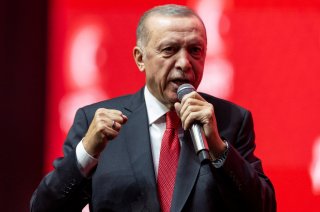Orbán and Erdogan: With Friends Like These, NATO Doesn’t Need Enemies
Hungary’s leader is the EU’s enfant terrible in much the same way as Erdogan is NATO’s.
In Charlie Chaplin’s classic satire from 1940, “The Great Dictator,” Tomainia’s leader, Hynkel, hosts a state visit from another dictator, Napaloni, from Bacteria. This brings to mind the recent meeting in Budapest between Hungary’s prime minister Viktor Orbán and Turkey’s president Recep Tayyip Erdogan.
The visit, Erdogan’s second in four months, was intended to mark the centenary of diplomatic relations between the two countries, but the underlying intention was to deepen their strategic partnership. Seventeen agreements were signed, and Erdogan gifted his host a Togg, a Turkish electric car. In return, he received a horse.
Hungary’s leader is the EU’s enfant terrible in much the same way as Erdogan is NATO’s. Indeed, Orbán’s ruling Fidesz party can be considered the mirror image of Erdogan’s AKP (Justice and Development Party), and they make use of comparable tactics.
A year ago, the European Commission decided to withhold €22 billion in cohesion funds for Hungary because of concerns about fundamental human rights and the rule of law. However, the day before a recent summit, the commission decided to unblock €10.2 billion, but nevertheless, a further €21 billion remains blocked.
Even though European leaders agreed to open membership talks with Ukraine, Orbán still succeeded in blocking €50 billion in aid for the beleaguered nation. Consequently, Hungary has once again run Moscow’s errand in the same way as Turkey’s Erdogan runs Moscow’s by blocking Sweden’s membership of NATO.
The grace note is that, according to Orbán, Russia’s invasion of Ukraine is not a war but a military operation. Accordingly, Hungary has repeatedly opposed sanctions against Russia.
Turkey’s original objection was that Sweden harbors “terrorists,” i.e., members of the Kurdistan Workers’ Party and the outlawed Gülen movement. Now, this has become transactional. Even though Turkey has been excluded from the F-35 strike fighter program because of CAATSA sanctions, Erdogan demands that the U.S. Congress approve the sale of F-16 fighters and modernization kits in return for Sweden’s membership.
Erdogan tells the United States, “If the U.S. has a Congress, we also have our parliament.” Turkey’s foreign affairs committee has approved Sweden’s accession, but this has to be approved by a plenary session in mid-January at the earliest.
Before the NATO summit in Vilnius in July, Erdogan also offered to agree to Sweden’s NATO membership in exchange for support for Turkey’s EU membership bid.
Hungary, as a NATO member, has, in tandem with Turkey, not yet ratified Sweden’s membership.
The fact that Hungary will take over the rotating presidency of the EU starting in July no doubt enters into Erdogan’s calculations. In June, the European Parliament questioned whether Hungary would “credibly” be able to fulfill this task given its non-compliance with EU law, which no doubt will be water to Erdogan’s mill.
Despite all the setbacks, Erdogan still maintains that full EU membership is a strategic priority. In the short term, Turkey calls for an unconditional start to talks on upgrading the 1996 customs union agreement and visa liberalization. An obstacle to the first is Turkey’s circumvention of EU sanctions on Russia and also Turkey’s refusal to abide by UN resolutions as a basis for a solution to the Cyprus question.
The EU Commission’s report in November specifies the obstacles, and the European Parliament’s report in September details the objections. The Turkish Foreign Ministry, in response, found the latter “a collection of unfounded allegations and prejudices based on disinformation by anti-Türkiye circles.”
The U.S. State Department also deals with Turkey’s human rights practices in its 2022 report.
Another organization to which Turkey, in principle, is committed is the Council of Europe. Its forty-six member states (Russia was excluded last year) are signatories to the European Convention on Human Rights, but Turkey is also an outlier here. Of the 71,450 applications pending before the European Court of Human Rights, one-third stem from Turkey.
Foremost among the cases already dealt with are the convictions of Selahattin Demirtas, co-chair of the Peoples’ Democratic Party, who has been imprisoned since 2016, and Osman Kavala, a philanthropist and businessman, in prison since 2017. Turkey has refused to abide by the court’s decision to release them. As Erdogan said in 2016, “We’re going our way, you go yours.”
The Committee of Ministers of the Council of Europe has reiterated its call for their release but has taken no action otherwise.
Sinan Ciddi has strongly argued in Foreign Policy for Turkey’s exclusion from the NATO alliance and concludes it is long past time that Erdogan was read the Riot Act. In one of his many fables, Aesop writes about a council of mice who all agree it would be an excellent idea to bell the cat to warn of its coming. As an old mouse remarks, that’s all very well, but who is to bell the cat?
Robert Ellis is a Turkey analyst and commentator. He is also an international advisor at RIEAS (Research Institute for European and American Studies) in Athens.

